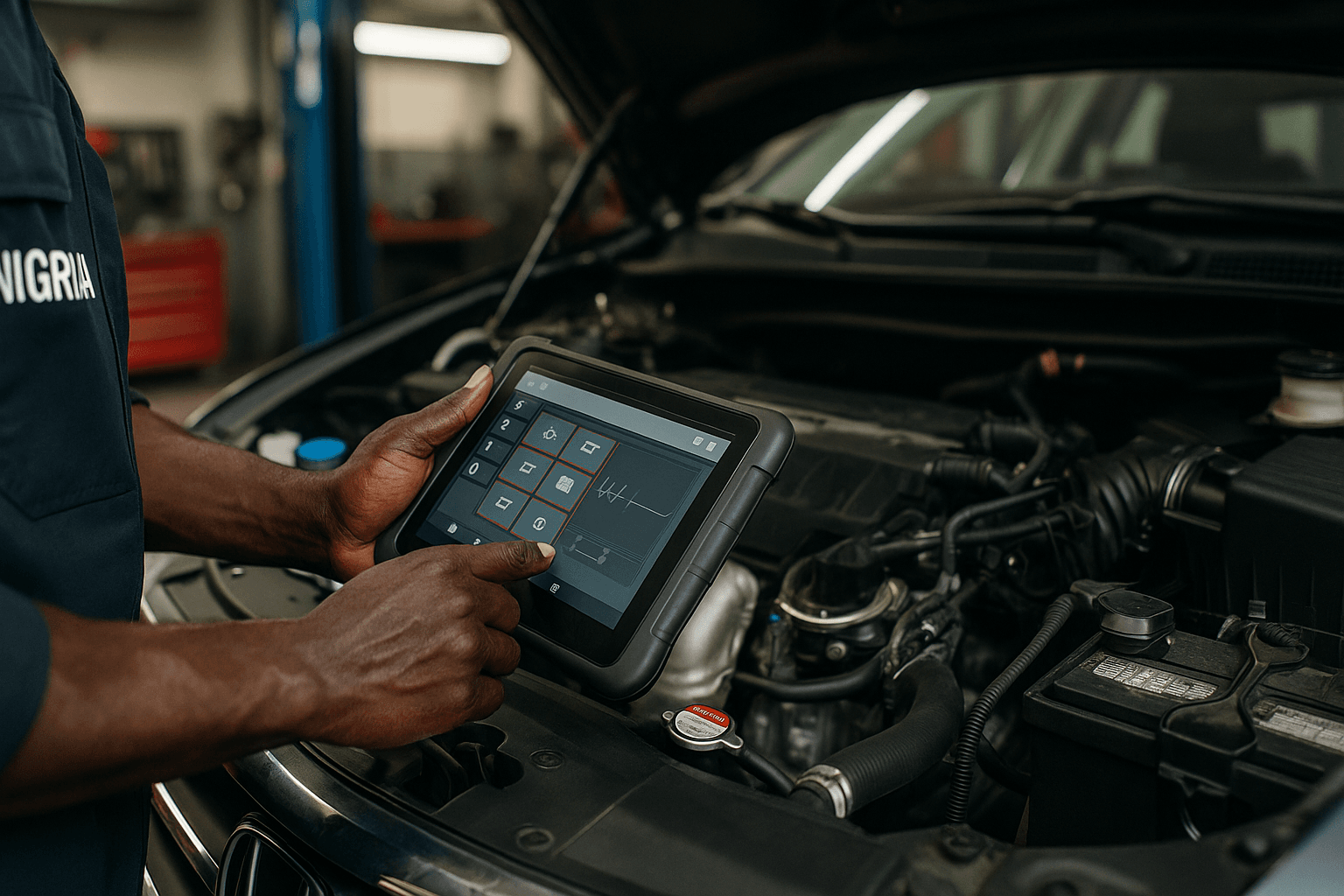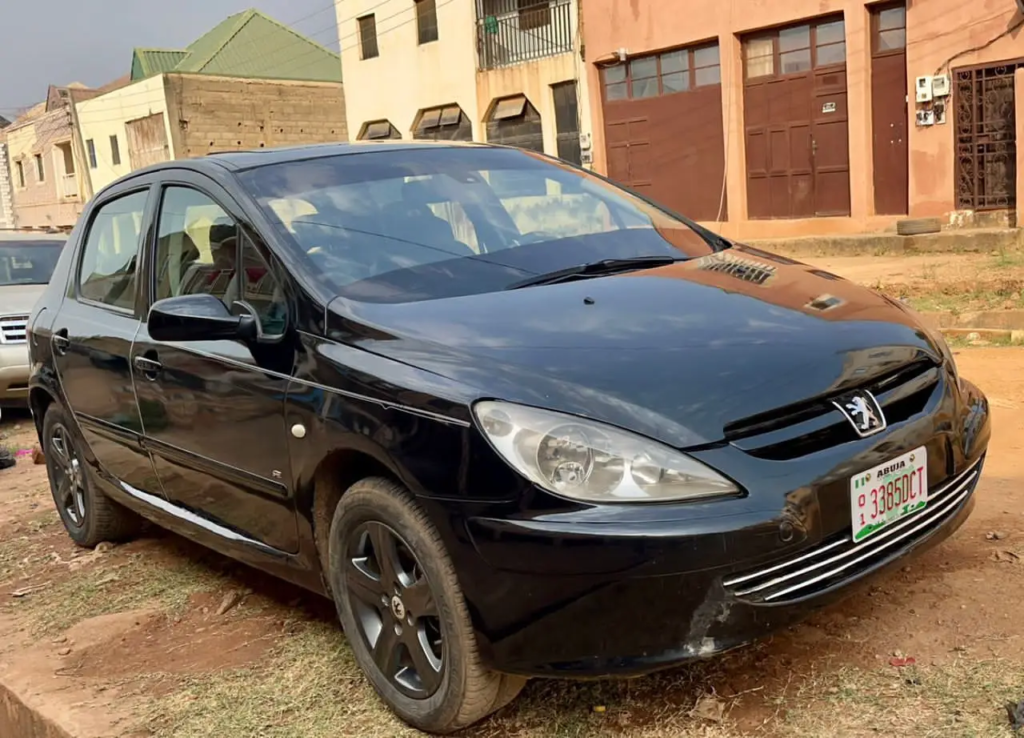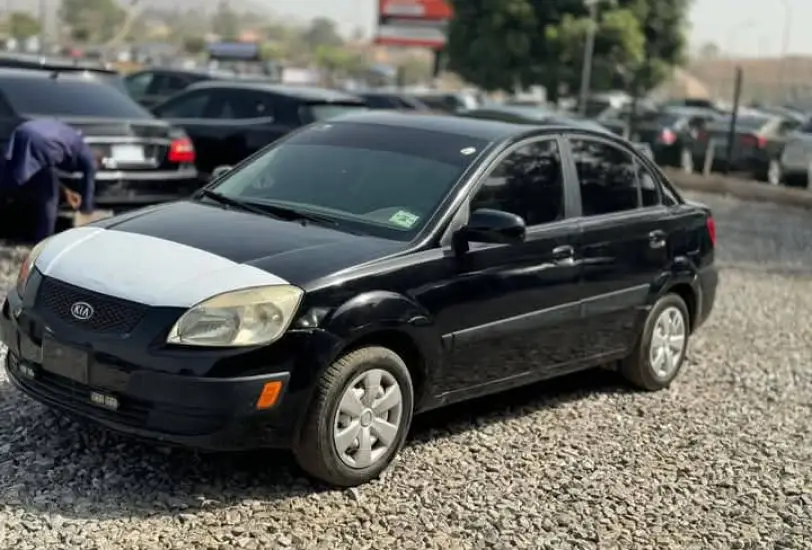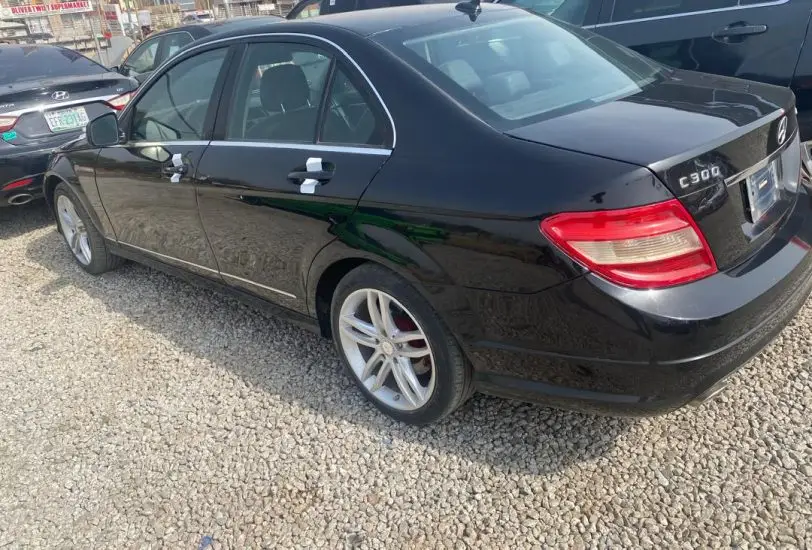Congratulations! You’ve navigated the market, dodged the pitfalls, and finally gotten the keys to your Tokunbo car. The feeling of freedom and accomplishment is undeniable. But as every smart car owner in Nigeria knows, the journey doesn’t end with the purchase; it truly begins.
Owning a car is one thing; keeping it running smoothly without it becoming a source of “wahala” is another challenge entirely. Proper maintenance is the secret to ensuring your prized investment serves you faithfully for years to come, protecting its value and guaranteeing your safety on the road.
This is your ultimate guide to Tokunbo car ownership and maintenance in Nigeria. Consider this your vehicle’s manual, tailored specifically for our unique environment. We will cover everything from creating a smart maintenance schedule and finding a trustworthy mechanic in Abuja to navigating vehicle paperwork and solving the most common car problems you’re likely to face on Nigerian roads.
Key Takeaways
- Proactive Maintenance is Cheaper Than Reactive Repairs. The single most important rule for Tokunbo car ownership in Nigeria is consistency. The challenging road conditions and climate accelerate wear and tear. Adhering to a regular service schedule is proven to prevent minor issues from escalating into major, expensive failures.
- The 5,000 km Service is Your Car’s Lifeline. For a foreign-used vehicle operating in Nigeria’s high-temperature, stop-and-go traffic environment, changing the engine oil and filter every 5,000 km is the most critical step you can take to ensure engine longevity and performance.
- Choose Your Mechanic Wisely. Finding a competent and trustworthy mechanic is paramount. Always seek personal recommendations and favor workshops that use proper diagnostic tools. Relying on guesswork can lead to the use of incorrect or substandard parts, causing recurring problems and costing you more in the long run.
- Understand the Spare Parts Trade-Off. While Tokunbo parts from markets like Ladipo are affordable, they are a gamble with no warranty. For critical components, balance the immediate cost savings of used parts against the long-term reliability offered by high-quality aftermarket or new OEM parts.
- Keep Your Vehicle Papers Complete and Current. To avoid costly fines or having your vehicle impounded by authorities like the FRSC or VIO, ensure your Vehicle License, Certificate of Roadworthiness, and at least a Third-Party Insurance policy are always valid and accessible in your car.
The Foundation: Your Tokunbo Car Maintenance Schedule
A Tokunbo car arrives in Nigeria with a history. While often better maintained than its locally used counterparts, it’s now entering a far more demanding environment. The combination of intense heat, stop-and-go traffic, pervasive dust, and challenging road conditions means a standard manufacturer’s service schedule is often not enough. A proactive, Nigeria-specific Tokunbo car maintenance schedule is your first and most important line of defense against premature wear and tear.
Upon acquiring your vehicle, it’s absolutely crucial to perform a baseline comprehensive service. Afterward, adhere to a schedule that respects our local realities.
Recommended Tokunbo Car Maintenance Schedule for Nigerian Conditions
For a deep dive into what each service entails, read our complete guide: Common Maintenance for Tokunbo Cars.
| Service Interval | Key Maintenance Tasks | Why it’s Critical in Nigeria (Tokunbo Car Focus) |
|---|---|---|
| Weekly (Driver Check) | – Check engine oil level & quality. – Check coolant level. – Check brake fluid level. – Visually inspect tyres for damage & pressure (check pressure weekly with gauge). – Test all lights (headlights, indicators, brake lights). – Listen for unusual engine, brake, or suspension noises. – Check windscreen wipers & washer fluid. | – Fluids: High heat can increase evaporation/degradation. Tokunbos may consume some oil. – Tyres: Poor roads increase risk of damage/pressure loss. – Lights/Noises: Early detection of issues vital for safety & preventing bigger problems in older cars. |
| Monthly (Driver/Mechanic) | – All weekly checks. – Thoroughly check tyre pressure (including spare) with a gauge & inspect tread wear. – Top up fluids as needed (oil, coolant, brake, power steering, washer). – Inspect battery terminals for corrosion; clean if necessary. – Check air filter condition, especially in dusty areas. | – Tyre Pressure/Wear: Critical for safety & tyre life on bad roads. – Battery: Heat & age affect battery performance; corrosion impedes starting. – Air Filter: Dust clogs filters quickly, impacting fuel efficiency & engine health. |
| Every 3 Months / Every ~5,000 km (Mechanic Recommended) | – Change engine oil and oil filter (use appropriate grade oil; more frequent for mineral oil or severe conditions). – Rotate tyres. – Inspect brake pads, discs, lines, and hoses. – Check battery health (voltage, electrolyte if applicable) & secure connections. – Clean or replace air filter. – Inspect belts and hoses for wear/cracks. – Basic diagnostic scan, especially if any warning lights are on or performance issues noted. | – Oil Change: Most critical for Tokunbo engine longevity in harsh conditions (heat, dust, traffic). – Tyre Rotation: Promotes even wear, extending tyre life on abrasive roads. – Brakes/Filters: Essential for safety & engine protection; Tokunbos may have more wear. |
| Every 6 Months / Every ~10,000 – 15,000 km (Mechanic Recommended) | – All quarterly checks. – Service brakes (clean, lubricate, replace pads/shoes if needed). – Wheel alignment and balancing (or if car pulls to one side). – Inspect suspension components thoroughly (shock absorbers, struts, bushings, ball joints) for wear/leaks. – Inspect steering components. – Check exhaust system for leaks/damage. – Inspect CV joints and drive shaft boots. | – Brakes/Suspension/Alignment: Directly impacted by poor road conditions; vital for safety & handling. – Exhaust/CV Joints: Prone to damage from rough terrain. |
| Annual / Major Service / Every ~20,000 – 30,000 km (Mechanic Recommended) | – All bi-annual checks. – Replace spark plugs (refer to car manual for type/interval). – Flush and replace coolant. – Change transmission fluid (automatic/manual – check manual for specific interval, critical for Tokunbos). – Replace fuel filter (more frequently if poor fuel quality is suspected). – Full diagnostic scan. – Service air conditioning system (check refrigerant, clean components). – Consider differential fluid change (if applicable). | – Spark Plugs/Fluids: Essential for engine performance, cooling, and transmission health. Tokunbo components may be near end-of-life. – Fuel Filter: Protects sensitive fuel system parts from contaminants common in some fuel supplies. – AC Service: Ensures comfort in hot climate. |
Finding a Reliable Car Mechanic in Abuja: The Good, The Bad, and The Ugly
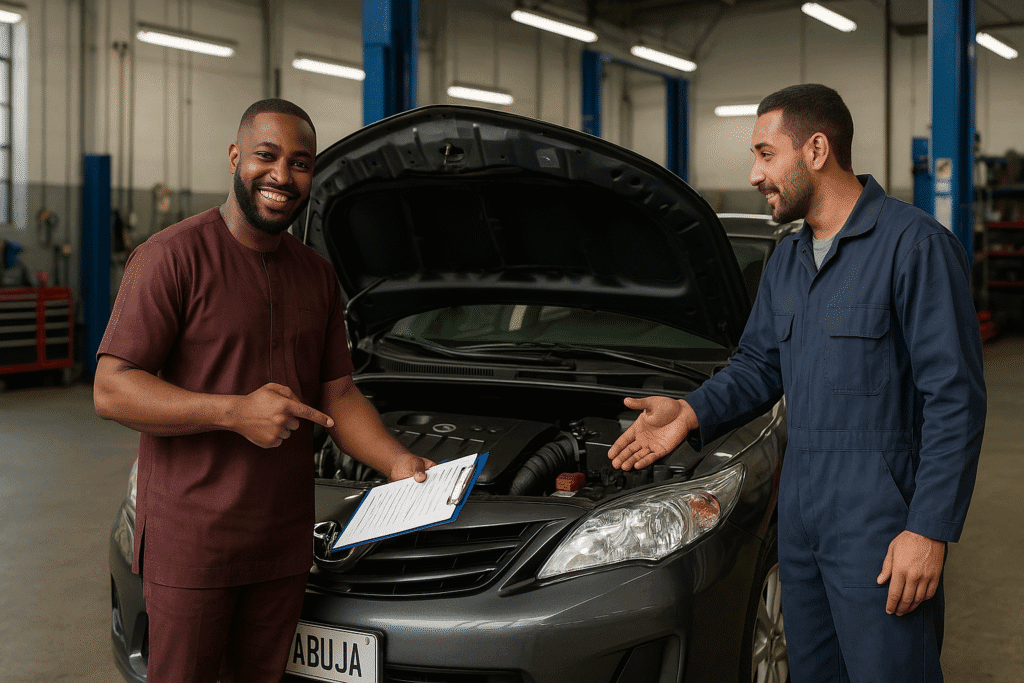
Your relationship with your mechanic is one of the most important you’ll have as a car owner. A great “mechanic doctor” can save you millions of Naira over the life of your car. The challenge is sifting through the options.
Choosing Your Mechanic: Dealership vs. Independent vs. Roadside
| Feature | Dealership Service Centers | Independent Workshops (Formal/Specialist) | Roadside Mechanics (Informal) |
| Pros for Tokunbo Owners | – Factory-trained technicians for specific brands. – Use of genuine OEM parts. – Advanced diagnostic tools. – Often provide service warranties. | – Generally more affordable. – Can offer more personalized service. – May specialize in certain brands (e.g., Toyota, German cars). – Flexibility in using OEM or quality aftermarket parts. | – Typically the cheapest option for labor. – Convenient for minor roadside emergencies. |
| Cons for Tokunbo Owners | – Usually the most expensive option. – May prioritize newer models over older Tokunbos. – Less flexibility on part sourcing. | – Expertise and equipment quality can vary widely. – Generalists may lack deep knowledge of specific Tokunbo models. – Warranties may be limited or informal. | – High risk of substandard work and incorrect diagnosis. – Often use low-quality or incorrect parts. – No warranty or accountability. |
| Best For (Tokunbo) | – Complex electronic issues or brand-specific problems.<br>- When genuine OEM parts are paramount and budget allows. | – Routine maintenance and common repairs. – Owners seeking a balance of cost and quality. – Accessing specialist knowledge outside of dealerships. | – Very minor, straightforward emergency fixes when no other option is available. Use with extreme caution. |
For a list of vetted workshops and specialists, check out our directory: Finding Reliable Mechanics in Abuja.
Staying Legal: A Guide to Vehicle Paperwork & Registration in Nigeria
Owning a car is one thing; owning it legally is another. Flawless documentation is non-negotiable.
Initial Tokunbo Car Registration: Key Documents & Potential Costs
| Document/Fee Item | Purpose/Description | Estimated Cost Range (NGN) (Illustrative) |
| Customs Clearance Papers | Proof of legal importation and duty payment | Varies (based on vehicle value/duty) |
| Proof of Ownership | Confirms legal ownership transfer | – |
| Valid Insurance (Min. Third Party) | Legally required motor insurance coverage | ₦5,000 – ₦15,000 (Third Party) |
| Vehicle Inspection/Roadworthiness | Certifies vehicle is safe for road use | ₦3,000 – ₦8,000 |
| Number Plates | Official vehicle identification plates | ~₦18,750 – ₦25,000 |
| Vehicle License | Annual license to use the vehicle on public roads | ₦4,000 – ₦10,000+ (vehicle type dependent) |
For downloadable forms and a detailed walkthrough, see our guide: Vehicle Paperwork & Registration.
The Hunt for Parts: Navigating the Tokunbo Spare Parts Market
When a part needs replacing, you face a critical decision. Here’s how the options stack up:
Spare Parts Showdown: OEM vs. Aftermarket vs. Tokunbo
| Feature | New OEM Parts | New Aftermarket Parts | “Tokunbo” (Used OEM/Aftermarket) Parts |
|---|---|---|---|
| Definition | Made by car manufacturer | Made by third-party companies | Salvaged from other (often imported used) vehicles |
| Pros | Perfect fit & function, original quality, manufacturer warranty. | More affordable, wider selection, some brands offer high quality & improved designs. | Significantly cheaper, often original OEM components, wide availability for popular models. |
| Cons | Most expensive, limited purchase points (dealers). | Quality varies greatly, potential fitment issues, warranty may be limited/none, may void new car warranty. | Condition highly variable (risk of faulty/worn parts), no warranty, requires expertise to select good ones. |
| Estimated Cost Factor | High | Low to Medium | Very Low to Low |
| Quality/Reliability Perception in Nigeria | Highest | Variable (from very low to high, brand dependent) | Variable (depends on source and part condition; good ones can be reliable) |
| Availability in Nigeria | Dealers, some specialized stores | Widely available (parts stores, workshops, online) | Very wide, especially in markets like Ladipo, online platforms. |
| Best Suited For | Critical components, maintaining vehicle integrity if budget allows, newer Tokunbos. | Non-critical parts, budget repairs (with reputable brands), older vehicles where OEM is too costly. | Budget repairs, common mechanical parts where condition can be reasonably assessed, situations where new parts are prohibitively expensive or unavailable. |
For a list of trusted suppliers, see our directory: Tokunbo Car Parts & Accessories.
Empowering Yourself: Simple DIY Car Maintenance Tasks
You don’t have to be a master mechanic to take control of your car’s health. Learning these basic tasks can save you money and prevent small issues from becoming major headaches.
- Checking Your Engine Oil: This is the #1 most important check. Learn to read your dipstick weekly.
- Inspecting Your Tyres: Check tyre pressure weekly with a reliable gauge. Look for uneven wear, cuts, or bulges. Don’t forget the spare!
- Cleaning Battery Terminals: A common cause of a car not starting is corroded battery terminals.
- Replacing Wiper Blades: Don’t get caught in a downpour with bad wipers. This is a simple, 5-minute task.
Want to learn more? Read our full guide for beginners: DIY Car Maintenance Basics for Beginners.
Troubleshooting the Most Common Tokunbo Car Issues
Every Nigerian driver has faced these problems. Here’s what to do.
Why is My Car AC Not Cooling?
The AC is a lifeline in Nigeria. When it fails, it’s usually due to a refrigerant leak or a faulty compressor. Simply “topping up the gas” without fixing the leak is a waste of money. A proper diagnosis from an AC technician is key. A simple gas service might cost ₦6,000 – ₦10,000, but a new compressor can range from ₦120,000 to over ₦300,000 depending on your car model. For a detailed diagnostic guide, see [Link to Cluster: Solving Car AC Problems].
What to Do When Your Car is Overheating in Traffic
This is a driver’s nightmare. If your temperature gauge hits the red:
- Turn off the AC immediately.
- Turn on the heater to full blast. This pulls heat away from the engine.
- Pull over safely and turn off the engine.
- DO NOT open the radiator cap. Wait at least 30-45 minutes for the engine to cool completely before attempting to add water or coolant. Read our emergency guide: [Link to Cluster: What to Do When Your Car Overheats].
Securing Your Ride: A Guide to Car Security in Nigeria
Protecting your investment is crucial. A layered approach combining different types of devices offers the most robust protection.
Comparison of Car Security Devices for Tokunbo Cars in Nigeria
| Device Type | How it Works | Primary Benefit | Effectiveness Level | Estimated Cost Range (NGN) (Device & Installation) | Pros in Nigerian Context | Cons in Nigerian Context |
|---|---|---|---|---|---|---|
| GPS Tracker | Uses GPS for real-time location; data sent via cellular network. | Recovery | High (for recovery, if not jammed) | -Device: 12,800 – 75,000+ -System Install: 20,000 – 150,000+ -Possible Subscriptions | High recovery chance; features like geofencing, remote immobilization. | Vulnerable to signal jamming (unless anti-jamming equipped); effectiveness depends on network coverage; ongoing costs for some. |
| Car Alarm System | Sensors detect intrusion, triggering loud siren & flashing lights. | Deterrence | Medium | -System: 17,500 – 45,000+ -Part of broader install cost. | Audible alert can scare off thieves & attract attention. | Can be disabled by skilled thieves; prone to false alarms, reducing bystander response. |
| Engine Immobilizer | Electronic system preventing engine start without correct key/fob. | Prevention | High (for preventing drive-away) | Often factory-fitted; Aftermarket part of system install. | Highly effective against hot-wiring. | Determined thieves might try to bypass or replace ECU. |
| Steering Wheel Lock | Physical bar locking steering wheel, preventing turning. | Deterrence, Prevention | Medium | Device: 15,000 – 25,000+ | Visible deterrent; adds time to theft attempt. | Can be cut/broken by determined thieves with tools. |
| Pedal Lock | Clamps onto brake/clutch/accelerator pedals, immobilizing them. | Deterrence, Prevention | Medium to High | Device: 12,000 – 50,000+ | Strong physical barrier; visible deterrent. | Can be cumbersome to use daily; quality varies. |
| Gear Lock | Locks gear shifter in Park/Reverse, preventing gear selection. | Deterrence, Prevention | Medium to High | Device: ~40,000+ | Robust physical barrier; visible deterrent. | Installation may be more invasive; less common than other locks. |
Secure your vehicle with tips from our Car Security and Anti-Theft Solutions guide.
Conclusion: From Car Owner to Car Master
The journey of owning a Tokunbo car in Nigeria is rewarding. With a proactive approach to maintenance, a commitment to using quality parts, and a network of trusted professionals, you can ensure your vehicle remains a reliable asset, not a financial burden. Proactive care is always cheaper and less stressful than reactive repairs.
At Autokunbo.com, we’re here for the entire journey. From providing meticulously inspected vehicles to connecting you with the resources you need for long-term ownership, we are your trusted partner on the road.
Explore our resources or contact our support team today to learn more.


